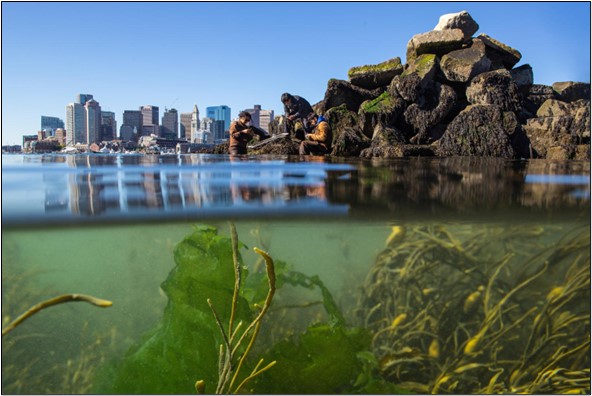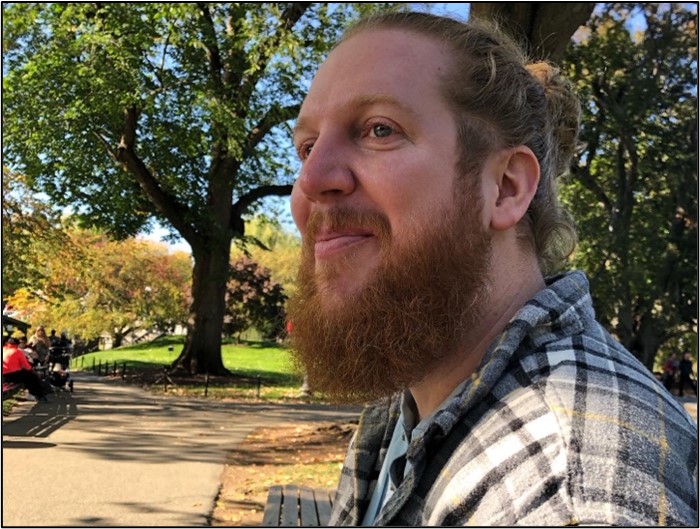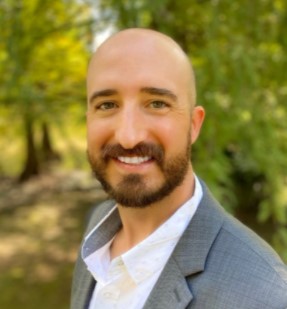The City of Boston is experiencing climate change and taking action to build urban resiliency through their Climate Ready Boston initiative. In Season 6, Episode 2 of the EWN® Podcast, Host Sarah Thorne is joined by Co-host Andrew McQueen, Research Biologist in the Environmental Laboratory of the Engineer Research and Development Center, USACE, and Joe Christo, Managing Director of the Stone Living Lab in Boston, Massachusetts. Both are passionate about integrating nature-based solutions (NBS) into resilience projects to help address coastal and inland flooding in Boston and beyond.
Growing up in rural Louisiana influenced Andrew’s early interest in the sciences and biology in particular, but it was Hurricane Katrina that hit Louisiana in 2005 and the Deepwater Horizon oil spill in the northern Gulf of Mexico near the US coast in 2010 that really shaped his career. Andrew notes Hurricane Katrina hit as he was finishing his undergraduate degree: “I traveled to New Orleans where I had some family, and saw the scale of destruction, post-Katrina. Just chatting with people and seeing the immense power of nature was a humbling experience.” Then, shortly after finishing his master’s degree, he had first-hand experience with the Deepwater Horizon oil spill: “I was actually part of a team that went out to the incident site 40 miles offshore. I got to see the scale and scope of some of the problems that we were facing. Looking on the horizon all you could see was this weathered oil as far as the eye could see in the Gulf of Mexico.” He went on to pursue his PhD in wildlife and fisheries biology with an emphasis in environmental toxicology, in part because he realized the scale of environmental challenges facing our nation, and the world. “I really wanted to understand and build a skillset in science and technology to provide solutions to those problems.”
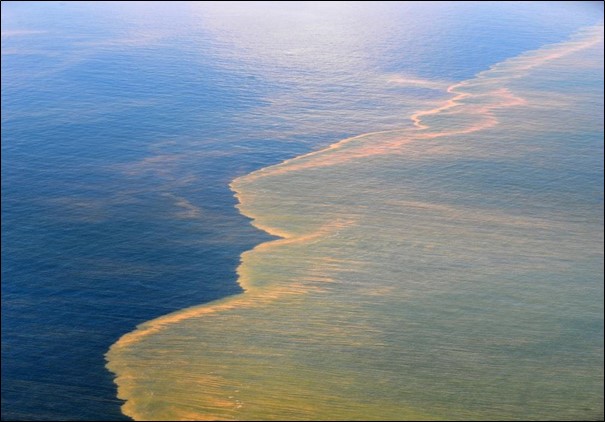
Similar experiences shaped Joe’s career. With an undergraduate education in journalism and political science, his early jobs focused on various aspects of public policy. While working in New York City in 2012, Hurricane Sandy hit. After some FEMA training, Joe helped run an evacuation shelter and spent a few days in the City’s Emergency Operations Center in Brooklyn. “That was a big career pivot for me that really changed the trajectory of my life. I’d always cared very much about communities that I lived in and had a love of nature. To see how sea level rise and coastal storms and climate change were so profoundly affecting the city was heartbreaking, but it was also inspirational.” After working on the recovery effort led by Mayor Bloomberg’s team, Joe went to grad school to study environmental planning. He then returned to Boston and worked on the Climate Ready Boston initiative, which led to his current leadership role at the Stone Living Lab.
Stone Living Lab’s mission is to conduct transformative research and outreach to make vulnerable regions adaptive to climate change while enhancing natural and built environments. Andrew and Joe first started working together at the Stone Living Lab’s first in-person conference, Nature-Based Coastal Resilience in Urban Settings, held in Boston, MA from April 26-28, 2023 where Jeff King, EWN National Lead, and Andrew served as Conference Committee Members. The conference brought together top experts from academia, industry, government, and environmental consulting firms to have meaningful discussions and exchange ideas on the latest advancements in using NBS to address climate change risks and sea-level rise in coastal urban environments.
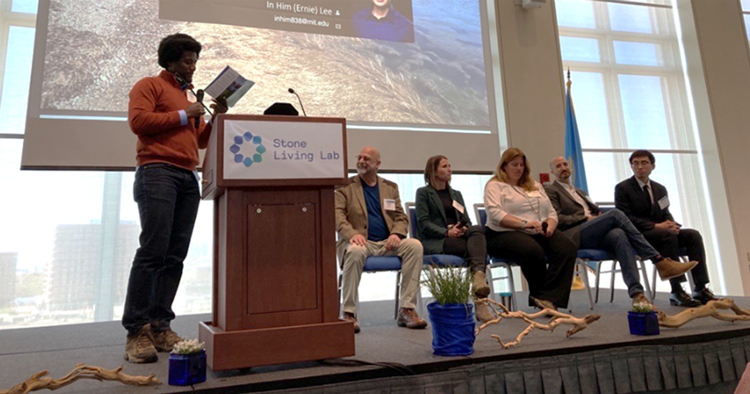
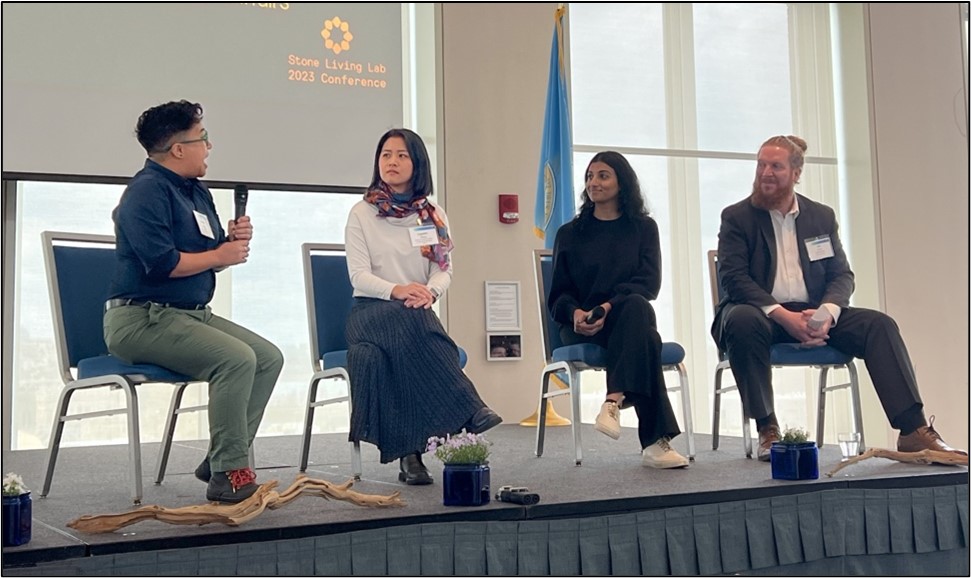
Andrew describes the nexus between critical infrastructure and the risk associated with coastal hazards: “We have this risk to deal with and one of the big questions is how do we buy down that risk? What opportunities do we have to manage our infrastructure, manage these environments, to offset that risk?” Storm surge associated with sea level rise and climate change is an area of focus for both USACE and the Stone Living Lab.
Joe talks about the imperative to build coastal resilience: “Climate change is, and will continue to increase coastal and riverine flooding, as well as other hazards like storm water flooding and extreme heat. With Hurricane Sandy, having barely missed Boston, the city knew it needed to prepare for more events like this, and for climate change. Climate Ready Boston was launched in 2016, covering a range of climate hazards and vulnerability assessments, looking at exactly what can be done throughout the city, working with community groups and residents and consultants. It has resulted in these Coastal Resilience Solutions reports that cover the 47 miles of coastline and really looks at how the people and neighborhoods of Boston can adapt.”
The Army Corps has been working on coastal resilience for a long time. As Andrew notes, “Salt marshes play a critical role in flood risk management, taking the bulk of the energy from storm surges on the coastline. We have observational data and scientific reports that date back to the sixties.” He adds, “restoring and maintaining salt marshes is really critical to flood risk management.” This is the goal of the recent Belle Isle Marsh Project in Boston. “The Belle Isle Marsh is a prime example of how a marsh in a very urbanized environment is providing benefit. There are a lot of efforts in Boston with a lot of great collaborators—from local, state, federal partners, to NGOs—to protect areas like Belle Isle Marsh and manage them in a way that provide a myriad of benefits, not just flood risk management, but economic benefits, social benefits, as well as those ecosystem services that we care about.”
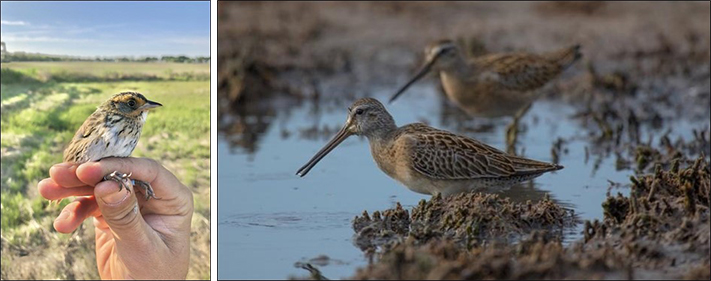
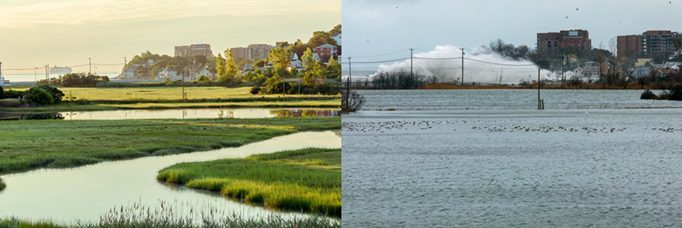
Belle Isle is just one of the projects the Corps is working on in the Boston area. Another is the Coastal Storm Risk Management Feasibility Study with the City of Boston. It is assessing long-term potential impacts, 50 to 100 years out, to understand what regions are at risk within the Greater Boston Area and then using that information to identify priority areas with the highest risk factors and then identifying what solutions can be applied to decrease those risks, everything from conventional infrastructure to NBS.
Joe and his colleagues at the Stone Living Lab are working in a number of areas that contribute to the broader Climate Ready Boston initiative through their research and monitoring (led by the Lab’s Research Director Paul Kirshen), education and engagement (led by the Lab’s Education and Engagement Program Manager Rebecca Shoer), policy, and climate preparedness work. They want to understand the effectiveness of nature-based approaches and determine out how these can be incorporated into the climate adaptation work being done in cities and towns.
